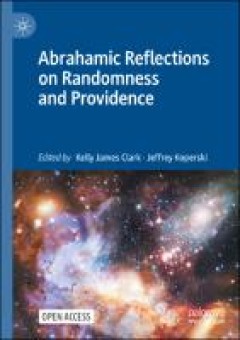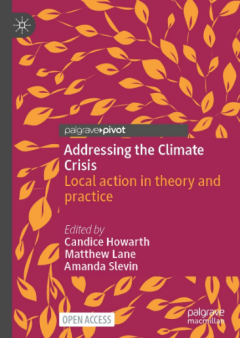Ditapis dengan
E-book Trickbox of Memory : Essays on Power and Disorderly Pasts
"Reach into this trickbox of memory and rummage around: you may find a tiny spaceship, or perhaps a signpost, a parade, a raised fist, an entire museum. The essays in Trickbox of Memory: Essays on Power and Disorderly Pasts draw on literary criticism, post-qualitative inquiry, new materialism, and political activism to dismember and reanimate the field of memory studies. In the trickbox, concep…
- Edisi
- -
- ISBN/ISSN
- 9781953035257
- Deskripsi Fisik
- 181 hlm
- Judul Seri
- -
- No. Panggil
- 153.12 GRU

E-book Abrahamic Reflections on Randomness and Providence
This open access book addresses the question of how God can providentially govern apparently ungovernable randomness. Medieval theologians confidently held that God is provident, that is, God is the ultimate cause of or is responsible for everything that happens. However, scientific advances since the 19th century pose serious challenges to traditional views of providence. From Darwinian evolut…
- Edisi
- -
- ISBN/ISSN
- 9783030757977
- Deskripsi Fisik
- 384 halm.
- Judul Seri
- -
- No. Panggil
- 210.1
E-book The Figure of Knowledge : Conditioning Architectural Theory, 1960s - 1…
In recent international literature addressing the history of twentieth-century archi-tectural theory, the year 1968 is often seen as a decisive moment, giving rise to a “new” architectural theory. From that moment onwards, less emphasis was placed on the aesthetics of architecture, and more on its critical potential. Increasingly, and also from that moment onwards, architectural theory beca…
- Edisi
- -
- ISBN/ISSN
- 9789461663221
- Deskripsi Fisik
- 322 hlm
- Judul Seri
- -
- No. Panggil
- 720.1 ALL t
E-book Forest Entomology and Pathology : Volume 1: Entomology
Insects and closely related arthropods are the dominant and most diverse forms of terrestrial and aquatic (non-marine) animal life on the planet. Other than marine systems, insects occupy every conceivable environment and habitat on the Earth. Crustaceans and Annelids (worms) are the dominant and most diverse groups of animals in marine systems. T…
- Edisi
- -
- ISBN/ISSN
- 9783031115530
- Deskripsi Fisik
- 810 hlm
- Judul Seri
- -
- No. Panggil
- 634.9 ALL f
E-book Psychology in Edgar Allan Poe
his volume presents recent critical work on Edgar Allan Poe andpsychology. It began in 2012 after careful consideration of whatwas lacking in Poe scholarship. Upon months of combing througharchives at McGill University, Concordia University, as well asJSTOR I discovered that nothing on Edgar Allan Poe and psychol-ogy had come around in many years. After more considerationI posted a Ca…
- Edisi
- -
- ISBN/ISSN
- 9783832549404
- Deskripsi Fisik
- 168 hlm
- Judul Seri
- -
- No. Panggil
- 364.3 GUE p
E-book Bromley Briefings Prison Factfile Winter 2022
In last year’s introduction to the Factfile I looked forward to the prospect of emerging from the Covid pandemic. How desperately mistaken that prediction has proved to be. Once again, for prisoners and their families, the pains of imprisonment have been terribly amplified by the restrictions imposed to prevent infection. Prisons have relaxed more slowly, and tightened up more quickly, than t…
- Edisi
- -
- ISBN/ISSN
- -
- Deskripsi Fisik
- 68 hlm
- Judul Seri
- -
- No. Panggil
- 365 HAL b

E-book Addressing the Climate Crisis: Local Action in Theory and Practice
This open access book brings together a collection of cutting-edge insights into how action can and is already being taken against climate change at multiple levels of our societies, amidst growing calls for transformative and inclusive climate action. In an era of increasing recognition regarding climate and ecological breakdown, this book offers hope, inspiration and analyses for multi-level …
- Edisi
- -
- ISBN/ISSN
- 9783030797393
- Deskripsi Fisik
- xxv, 143hlm : ill
- Judul Seri
- -
- No. Panggil
- 363.705 HOW a
E-book Animals, Plants and Afterimages : The Art and Science of Representing …
In hisremarkable study of the Upper Palaeolithic parietal art of Western Europe, The Mind in the Cave, David Lewis-Williams suggests that some imagery present in caves such as Chauvet and Lascaux was inspired by ex-periences of altered states of consciousness.1 Emergence from such altered states can be accompanied by the appearance of afterimages, mental pic-tures that hang suspended in the fie…
- Edisi
- -
- ISBN/ISSN
- 9781805390671
- Deskripsi Fisik
- 462 hlm
- Judul Seri
- -
- No. Panggil
- 704.943 BEN a
E-book Urban Design Governance : Soft powers and the European experience
Europe has a long history of urbanisation, with the first cities dating back some 8,000 years. While the formal means of decision-making (if any) used to shape the form of these settlements are lost in the mists of time, it is highly likely that from the earliest times some form of control was enacted on where and how people could build. Inadvertent controls would certainly have di…
- Edisi
- -
- ISBN/ISSN
- 9781800084254
- Deskripsi Fisik
- 331 hlm
- Judul Seri
- -
- No. Panggil
- 711 CAR u
E-book The Botanical City
In Betty Smith’s description of the tree of heaven (Ailanthus altissima), also known as the “ghetto palm,” the tree is contrasted with the memory of a school poem that evoked the “forest primeval” with its “murmuring pines and hemlocks.” For Smith, writing in the early 1940s, the presence of this tree was a marker, or even harbinger, of neighbourhood decline. The tree of heaven se…
- Edisi
- -
- ISBN/ISSN
- 9783868595192
- Deskripsi Fisik
- -
- Judul Seri
- -
- No. Panggil
- 580.73 GAN t
 Karya Umum
Karya Umum  Filsafat
Filsafat  Agama
Agama  Ilmu-ilmu Sosial
Ilmu-ilmu Sosial  Bahasa
Bahasa  Ilmu-ilmu Murni
Ilmu-ilmu Murni  Ilmu-ilmu Terapan
Ilmu-ilmu Terapan  Kesenian, Hiburan, dan Olahraga
Kesenian, Hiburan, dan Olahraga  Kesusastraan
Kesusastraan  Geografi dan Sejarah
Geografi dan Sejarah